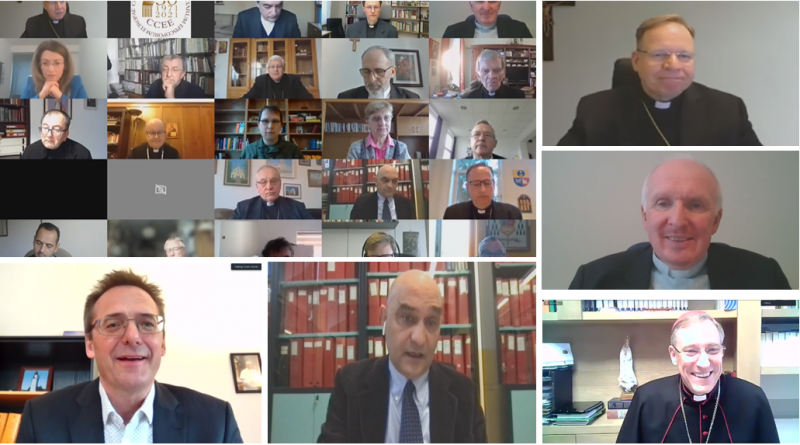On the morning of 15 February 2022, the study seminar promoted by the Section for Interreligious Dialogue of the CCEE Evangelisation and Culture Commission took place.
The seminar was opened by H.E. Msgr Gintaras Grušas, CCEE President and H.E. Msgr Zhibgvnes Stankevics, President of the Commission for Evangelisation and Culture.
The seminar focused on two topics: Islam in Europe between Inclusion and Exclusion, developed from the report by Erwin Tanner and a panorama of religious pluralism in Europe presented in the report by Pierluigi Zoccatelli.
In his presentation, Tanner focused on the cases in two States: Switzerland and France. In Switzerland, the relationship with religious communities – which depends on the various Cantons – is developed in a generally pragmatic way, taking into account local situations and individual issues, with a view to inclusiveness. France, on the other hand, is more characterised by an underlying political horizon that takes the form of “citizenship” rooted in a decidedly secular vision of the State. However, the new and interesting fact that emerged from the report is that, in France, there is a shift from a militant secularism, which excludes or marginalises religions from the public space, towards a dynamic secularism that seems to take into account religious traditions as cultural factors which need to be both controlled and appropriately managed. This controlled management, which is also prepared to make cultural use of certain non-spiritual aspects conveyed by religious traditions (history, language), is aimed at containing forms of identity and communitarian withdrawal, which would lead to the implosion of society, especially in urban suburbs with a high concentration of immigrant and Muslim populations.
The dynamic relationship between inclusivity and exclusion in political practices, which corresponds – not necessarily in a mirrored way – to integration processes and identity affirmations of a communitarian type, is certainly an important paradigm for interpreting the dynamics of the relationship between Muslim communities and European States today, with different outcomes depending on the orientations promoted by the States themselves.
Zoccatelli’s report showed that religious pluralism in Europe goes beyond Islam alone. There are almost a thousand organised religious minorities in Europe, belonging both to traditional religions such as Hinduism, Buddhism and Sikhism, as well as new religious movements. Although the percentages at European level are lower than for Muslims, in some specific States they reach significant proportions such as Hinduism in Great Britain and the Netherlands as well as Buddhism in France and Italy. This is also the case elsewhere. Hence the urgency for the Catholic Church in its local expressions to activate paths of knowledge and dialogue at least with the communities belonging to the great world religions.
It should be noted that the observation of such a high rate of religious pluralism raises new questions about the spiritual quests of the “European man” today, which the evangelisation initiatives of the Catholic Church are called upon to address.
Finally, Katerina Pekridou, secretary of the section for theological dialogue of the CEC (Conference of European Churches), illustrated the theological paradigm on which CEC initiatives are based. It is focussed on “koinonia” – communion – as a reality to be lived within individual religious communities, to be extended in ecumenical and interreligious relations, and to include the ecological question of the communal relationship with creation.
The morning ended with an address from H.E. Msgr. Brendan Leahy, head of the CCEE’s Interreligious Dialogue Section.

